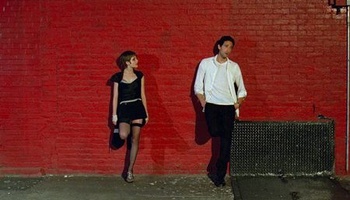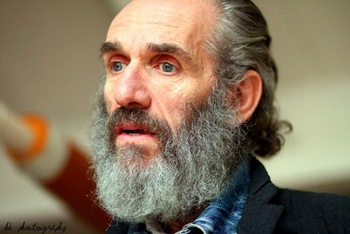There aren’t enough pages in Agenda to list all of Tony Kaye’s antics and stunts and the stories that are told about him. No matter: the most important thing is that the eccentric who once described himself in an ad as “the greatest English director since Hitchcock” is back making films. Kaye went through a rough time after American History X (1998). Detachment, however, shows that he should not be written off.
Through the eyes of temporary teacher Henry Barthes, we look at the teachers, pupils, and staff of a US state school that is teetering on the brink. In what seems to be an extremely ugly, unfeeling world, Barthes tries stoically to survive without giving in to indifference. Tony Kaye made Detachment, an imperfect but intriguing film, with the fury of an artist determined to be heard at all costs.
What were you trying to achieve with Detachment?
Tony Kaye: It is a film. I hope people will want to see it and be entertained. We put our hearts and souls into it with the aim of moving people. Nobody wants films that preach. But I do want to make films that
The resurrection of Tony Kaye


draw people into their content. Meredith, the character played by my daughter, gets no help at all. She is excluded by everyone. Maybe Detachment could prompt someone to hold out a hand to isolated people.
This is my third film to be shown in cinemas. There are more coming. It has cost me a lot of time to achieve some continuity in my work. I don’t understand how the system works, nor how I can bend it to my advantage. American History X was about racism; Lake of Fire was about abortion; Detachment is set in the education system. I do indeed look for subjects that resonate in society. I want to contribute to the public debate. I still fervently believe that even in the entertainment sector you should make things that do more than just entertain.
You don’t shrink from using shock tactics. A voicemail from a teacher yelling that the schoolchildren are driving him crazy turns into a speech by Hitler.
Kaye: Shocking people excites me. It is a tactic and a technique for getting a story or a message across clearly. To make it more vivid and more real. I want a strong emotional bond between the film and the viewer. So I jolt him awake. So I make him be scared and laugh and cry.
Maybe it’s a terrible thing to say, but shock tactics work. How do you bring a world war to an end? Hiroshima brings it to an end. Right or wrong, I don’t have to judge that.
Detachment suggests a war between children and the marketing deluge. It’s about fighting to have your own ideas and to formulate them.
Kaye: That is a brilliant observation by the screenwriter, Carl Lund. I just illustrate his idea: how it is important to be able to read. More than ever, we are bombarded with images and sounds. You are in a stronger position if you can read.
Personally, I think that it is more chaos than war. If you are too obsessively concerned with yourself, then you don’t take other people’s fate and their suffering seriously. That leads to indifference. And indifference leads to chaos. But each huge chaos creates opportunities. After Meredith’s tragedy, Barthes realises he has to help Erica.
You start with a quote from Albert Camus. Is Barthes Camus’s absurd hero who nobly takes on the futile struggle?
Kaye: Carry on, that sounds interesting. I’m afraid I can’t help you. I have nothing to do with the intellectual building blocks of the film’s architecture. I don’t have the capacity for that. I look after the emotional and human aspect and try to make the film seem real.
This is my third film to be shown in cinemas. There are more coming. It has cost me a lot of time to achieve some continuity in my work. I don’t understand how the system works, nor how I can bend it to my advantage. American History X was about racism; Lake of Fire was about abortion; Detachment is set in the education system. I do indeed look for subjects that resonate in society. I want to contribute to the public debate. I still fervently believe that even in the entertainment sector you should make things that do more than just entertain.
You don’t shrink from using shock tactics. A voicemail from a teacher yelling that the schoolchildren are driving him crazy turns into a speech by Hitler.
Kaye: Shocking people excites me. It is a tactic and a technique for getting a story or a message across clearly. To make it more vivid and more real. I want a strong emotional bond between the film and the viewer. So I jolt him awake. So I make him be scared and laugh and cry.
Maybe it’s a terrible thing to say, but shock tactics work. How do you bring a world war to an end? Hiroshima brings it to an end. Right or wrong, I don’t have to judge that.
Detachment suggests a war between children and the marketing deluge. It’s about fighting to have your own ideas and to formulate them.
Kaye: That is a brilliant observation by the screenwriter, Carl Lund. I just illustrate his idea: how it is important to be able to read. More than ever, we are bombarded with images and sounds. You are in a stronger position if you can read.
Personally, I think that it is more chaos than war. If you are too obsessively concerned with yourself, then you don’t take other people’s fate and their suffering seriously. That leads to indifference. And indifference leads to chaos. But each huge chaos creates opportunities. After Meredith’s tragedy, Barthes realises he has to help Erica.
You start with a quote from Albert Camus. Is Barthes Camus’s absurd hero who nobly takes on the futile struggle?
Kaye: Carry on, that sounds interesting. I’m afraid I can’t help you. I have nothing to do with the intellectual building blocks of the film’s architecture. I don’t have the capacity for that. I look after the emotional and human aspect and try to make the film seem real.
Are you back in business again at last, after a dark period?
Kaye: Since American History X I have tried to make loads of films. Either they didn’t get off the ground or they ended in disaster. I want to be the cause of a film, not the consequence of one. Detachment took shape slowly. But in the end I had just twenty days to shoot the film in a school just outside New York. I had to pull out all the stops to avoid it looking low-budget.
Clearly, Adrien Brody, Christina Hendricks, and James Caan didn’t let themselves be scared off by the wild stories going the rounds about you.
Kaye: Maybe the source material, the screenplay, was so good that they jumped at it despite my presence. Maybe, as time passes, people are beginning to realise that, all in all, I’m not the worst.
Detachment ●●●
US, 2011, dir.: Tony Kaye, act.: Adrien Brody, Christina Hendricks, 100 min.
> READ OUR INTERVIEW WITH ADRIEN BRODY
Kaye: Since American History X I have tried to make loads of films. Either they didn’t get off the ground or they ended in disaster. I want to be the cause of a film, not the consequence of one. Detachment took shape slowly. But in the end I had just twenty days to shoot the film in a school just outside New York. I had to pull out all the stops to avoid it looking low-budget.
Clearly, Adrien Brody, Christina Hendricks, and James Caan didn’t let themselves be scared off by the wild stories going the rounds about you.
Kaye: Maybe the source material, the screenplay, was so good that they jumped at it despite my presence. Maybe, as time passes, people are beginning to realise that, all in all, I’m not the worst.
Detachment ●●●
US, 2011, dir.: Tony Kaye, act.: Adrien Brody, Christina Hendricks, 100 min.
> READ OUR INTERVIEW WITH ADRIEN BRODY
Read more about: Film
Fijn dat je wil reageren. Wie reageert, gaat akkoord met onze huisregels. Hoe reageren via Disqus? Een woordje uitleg.